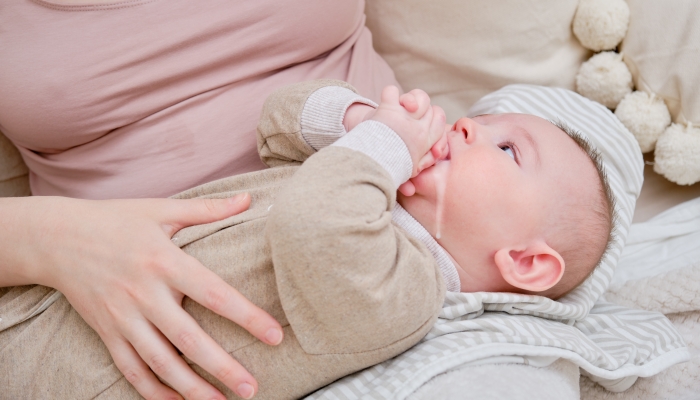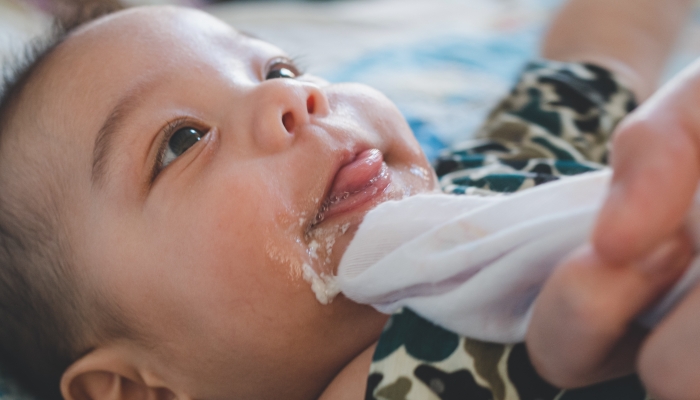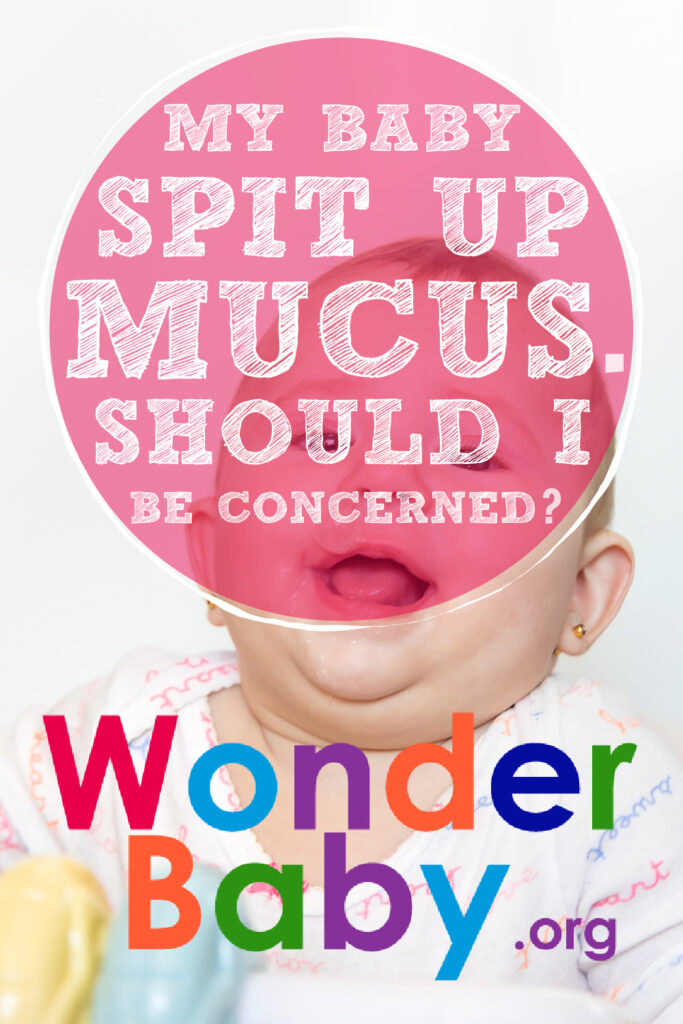My Baby Spit Up Mucus. Should I Be Concerned?

- Babies often spit up mucus because of a cold or congestion.
- Spitting up mucus is not usually a reason to be concerned.
- You can clean out your baby’s nose with a bulb syringe when they are spitting up mucus.
- If your baby has difficulty breathing or poor weight gain, you should see your pediatrician.
Spit-up is just a normal part of the daily routine for most parents of infants and babies. Babies have an immature digestive system and often have trouble keeping milk in their tummy where it belongs.
Most babies spit up just after eating and don’t seem to be bothered by it. The biggest problem usually caused by spit-up and wet baby burps is the amount of laundry that has to be done.
While new parents usually expect their baby to spit up breast milk or formula, it can be shocking and concerning to see a large amount of mucus coming from a baby’s mouth.
If you see your baby spit up mucus, it’s understandable that you might be concerned. While it can be perfectly normal for a baby to spit up mucus from time to time, there are some things to look out for.
Is It Normal for a Baby to Spit Up Mucus?
Babies can spit up many different kinds of body fluids. They may cough up or spit up clear stomach juices, excess saliva, curdled milk, digested food, or even mucus.
It’s normal for a baby to occasionally spit up mucus. Babies may also spit up curdled milk that looks like mucus or cottage cheese, which is perfectly normal too.
However, if it’s a repeated occurrence, you may want to talk to your child’s pediatrician. Babies who spit up excess mucus may be suffering from a cold or other infection. If your baby spits up green mucus or blood or has frequent episodes of mucus spit-up, they may have a digestive problem or infection.
Reasons Why Babies Spit Up Mucus

Newborn babies spitting up is not usually a cause for concern. If you notice your baby spitting up breastmilk or formula after they eat, you can just clean up the mess and not worry about it.
However, if your baby vomits or spits up mucus, keep a close eye on them. Reasons your baby may spit up mucus include:
Common Colds
When your child gets a cold, their nose and sinuses will fill with more mucus than normal. This mucus often drains down the back of the throat and gets swallowed. Eventually, your baby’s stomach can fill with this mucus, and they spit it back up. In the same way your baby regurgitates food, they can regurgitate mucus.
Common colds are usually mild, but colds caused by respiratory syncytial virus (RSV) are dangerous for young babies. A baby’s developing immune system is not ready to deal with viruses like RSV. In fact, the National Institute of Health states that RSV causes about 58,000 child hospitalizations each year.
Teething
Babies often get a lot more nasal drainage while they are teething. This excess saliva can lead to spitting up mucus. Excess drool and nasal drainage is a temporary phase that should resolve after your baby cuts their first teeth.
You can give your baby a cool teething ring to soothe their sore gums, but their spitting up will resolve on its own.
Bacterial Infections
While a baby’s digestive system can handle many types of bacteria, some bacterial infections may cause your baby to spit up mucus. Severe bacterial infections require antibiotic treatment. Other symptoms of a bacterial infection include fevers, yellow or green spit up, and poor appetite.
Exposure to Smoke or Allergens
Exposure to secondhand smoke or allergens can cause congestion and illness in babies. Just like with a cold, congested babies can swallow mucus and then spit it back up.
Experts at the Centers for Disease Control and Prevention (CDC) warn that exposure to secondhand smoke can also cause respiratory infections, along with ear infections and asthma attacks.
Pyloric Stenosis
Babies who start spitting up after the age of 6 months, or whose spitting up gets worse as they age, may be suffering from pyloric stenosis. This condition occurs because the sphincter that connects the stomach to the lower intensities cannot open properly. This forces the baby’s tummy to fill, and food comes back out through the mouth.
Digestive and Kidney Diseases
In rare cases, some digestive and kidney diseases can cause excessive spitting up in babies. Babies with these problems may experience severe infant reflux, poor growth, dehydration, and lethargy.
What to Do if Your Baby Is Spitting Up Mucus

If your baby is spitting up mucus, the most important thing to do is keep them comfortable and make sure that they are breathing easily. You can do this by sitting your baby upright and making sure that there are no stomach contents left in their mouth after they stop spitting up.
Since spitting up mucus is often caused by post-nasal drip, using a bulb syringe to clean out your baby’s nose and mouth can help future mucus spit-ups.
Can Spitting Up Mucus Affect Baby’s Growth?
Spitting up mucus should not affect your baby’s growth any more than spitting up formula milk or breast milk can. However, if you notice that your baby isn’t gaining weight, you should see their pediatrician.
When to Take Your Baby to a Doctor for Spitting Up Mucus
While spitting up mucus is not always concerning, you should take your baby to see a medical professional if they show any of the following signs:
Crying While Spitting Up
If your baby cries every time they spit up, it may be a sign of gastroesophageal reflux disease. Babies who have severe or problematic reflux experience pain in their stomach and throat when they spit up.
If your baby experiences painful spit-up, they may need medication to decrease the amount of acid in their tummy.
Respiratory Distress
Since spitting up mucus is often caused by respiratory viruses, you’ll want to keep a close eye on your child’s breathing if they are sick. Breathing fast, grunting while breathing, and blue fingertips or lips are signs of respiratory distress.
Fever
Fevers are a common occurrence in young children, but they should not be ignored. Fevers in babies under 2 months old are a sign of serious illness. Babies who are older can be treated with Tylenol, but they should still be seen by a pediatrician.
Weight Loss
If your baby is not gaining weight, or worse, is losing weight, you should talk to your pediatrician. According to the Mayo Clinic, babies should triple their birth weight by their first birthday.
Dry Membranes
If your baby has a dry tongue or lips, this is a sign of dehydration. Excess spit-up can cause dehydration and should be addressed with your child’s doctor right away.
Projectile Vomiting
There are a few ways to tell the difference between spit up and vomiting in babies. A baby’s vomit is usually forceful and accompanied by crying. In addition, babies only spit up 1–2 tablespoons at a time, while they may projectile vomit much larger volumes.
FAQs
Should you stop feeding a baby if they suddenly spit up mucus?
If your baby starts spitting up mucus during a feeding, stop giving them milk, sit them upright, and gently burp them. Allow your baby to finish spitting up, help them get any bubbles out of their tummy, and watch for signs that they are still hungry.
If your baby shows signs of hunger after spitting up mucus and taking a short break, it’s okay to keep feeding them.
Can babies choke on mucus at night?
Babies do not choke on mucus at night. The Department of Health and Human Services explains that babies who spit up while sleeping on their backs will automatically turn their heads, cough, or swallow.
It’s safest for babies to sleep on their backs at night, even when they have a cold or are spitting up.
Can a breastfeeding mom’s diet affect her baby’s spitting up mucus?
Unless the baby has a severe cow’s milk allergy, a breastfeeding mom’s diet does not usually affect her baby’s spitting up. Moms whose babies frequently spit up mucus can try eliminating dairy products from their diet to see if it helps.
Should I be concerned if my baby is spitting up mucus after switching to formula?
If you notice that your baby spits up more or has trouble eating after switching to formula, you may need to try a different brand. Many babies switch from breast milk to formula without any issues. However, for some babies, the stomach reacts poorly to change.
You can talk to your pediatrician about the best formulas for your baby if they have a sensitive stomach.
References
- Health Problems Caused by Secondhand Smoke. Centers for Disease Control and Prevention. Published November 1, 2022. Accessed May 15, 2023. https://www.cdc.gov/tobacco/secondhand-smoke/health.html
- Kidney Disease in Children. National Institute of Diabetes and Digestive and Kidney Diseases. Updated August 2022. Accessed May 15, 2023. https://www.niddk.nih.gov/health-information/kidney-disease/children#symptoms
- Mattke, Angela C., MD. Infant growth: What’s normal? Mayo Clinic. Published January 11, 2023. Accessed May 15, 2023. https://www.mayoclinic.org/healthy-lifestyle/infant-and-toddler-health/expert-answers/infant-growth/faq-20058037
- Myths and Facts About SIDS and Safe Infant Sleep. Eunice Kennedy Shriver National Institute of Child Health and Human Development. Accessed May 15, 2023. https://safetosleep.nichd.nih.gov/safesleepbasics/mythsfacts
- Respiratory Syncytial Virus (RSV). National Institute of Allergy and Infectious Diseases. Updated July 22, 2022. Accessed May 15, 2023. https://www.niaid.nih.gov/diseases-conditions/respiratory-syncytial-virus-rsv

The information WonderBaby provides is not intended to be, and does not constitute, medical or other health advice or diagnosis and should not be used as such. Always consult with a qualified medical professional about your specific circumstances.
Related Posts

Eye Conditions and Syndromes, Visual Impairment
Neuralink Announces Plans to Restore Sight to the Blind with Brain Chip
Elon Musk’s company Neuralink has announced plans to begin human trials of its new “Blindsight” brain chip by the end of 2025.

Health & Nutrition
Can Baby Skin Care Products Expire?
Is that forgotten tube of diaper rash cream still safe to use? Learn more about the expiration dates of popular skin care products for infants.

Health & Nutrition
Boosting Immunity in Kids: 3 Tips for a Healthy Winter
Parents can help boost their kids’ immunity during cold and flu season by maintaining healthy eating, sleeping, and exercising habits in the winter.